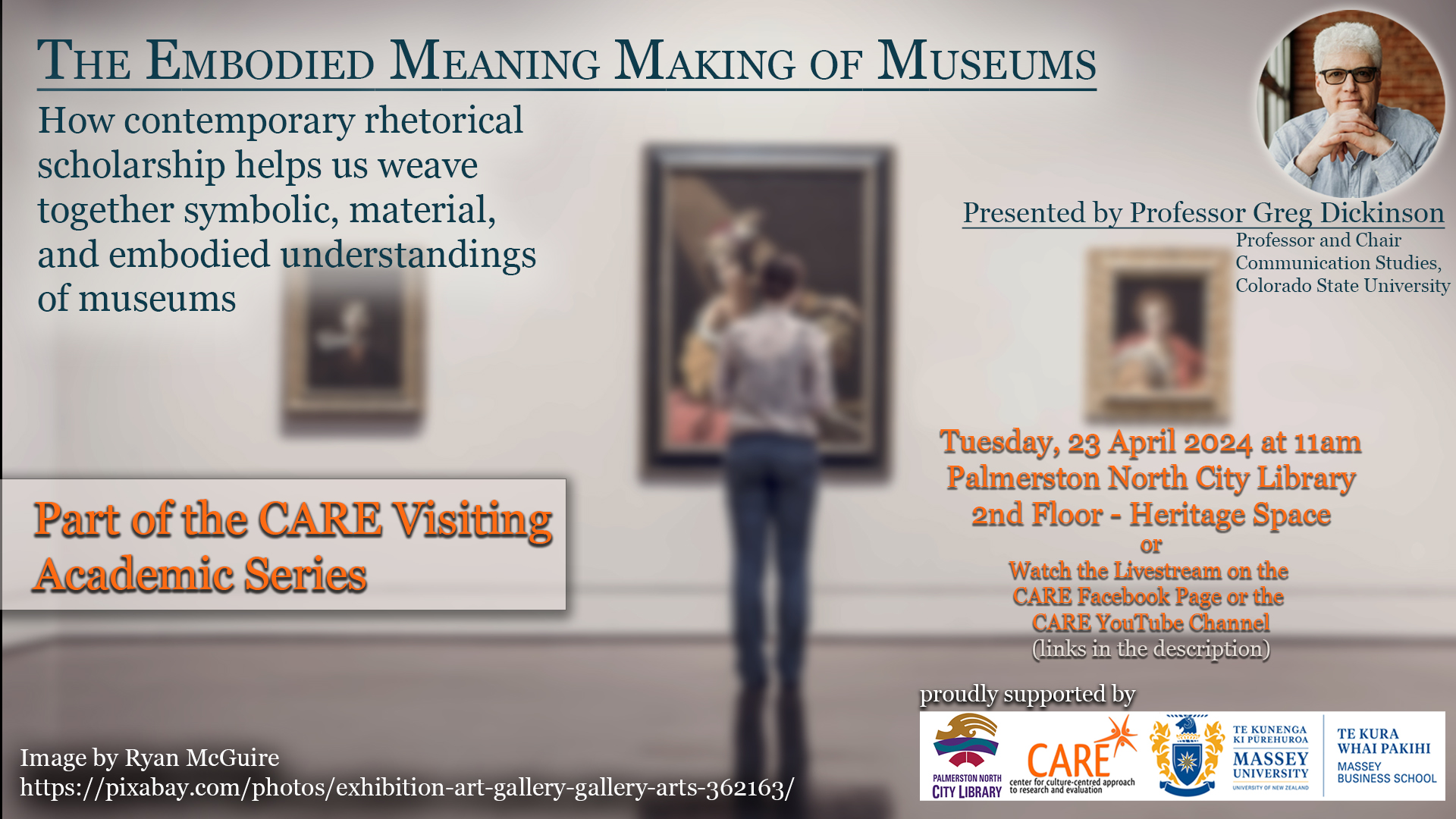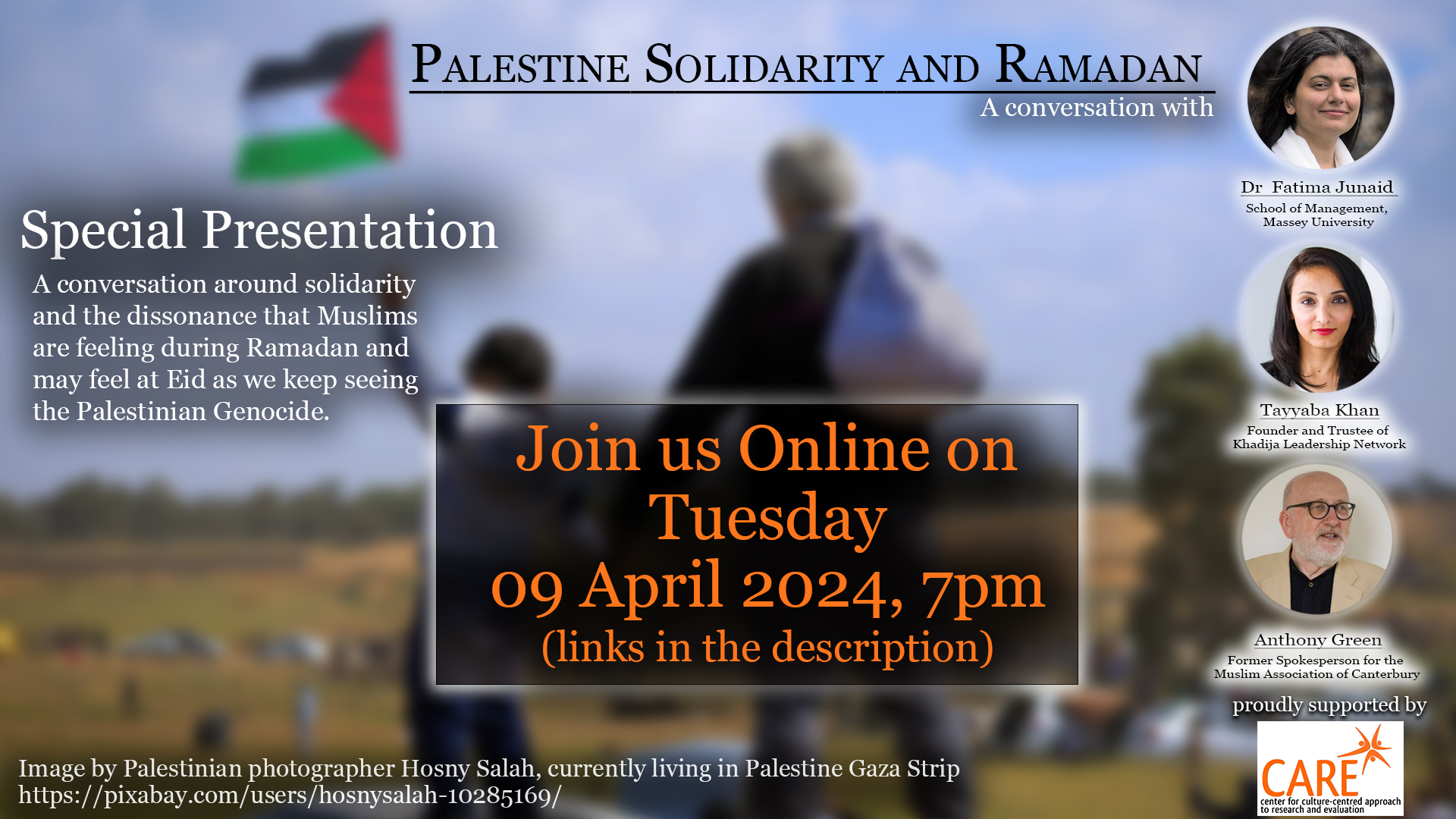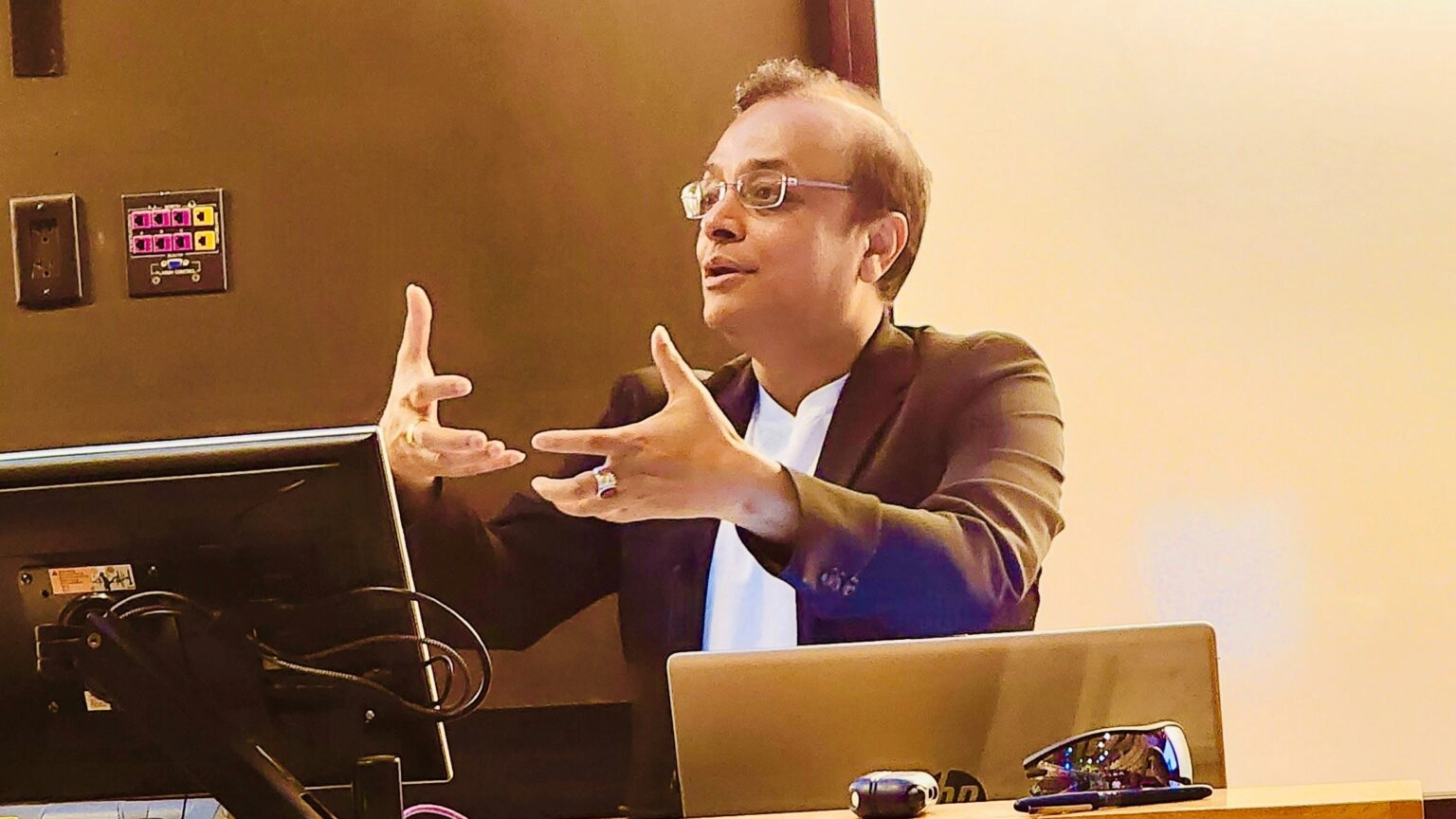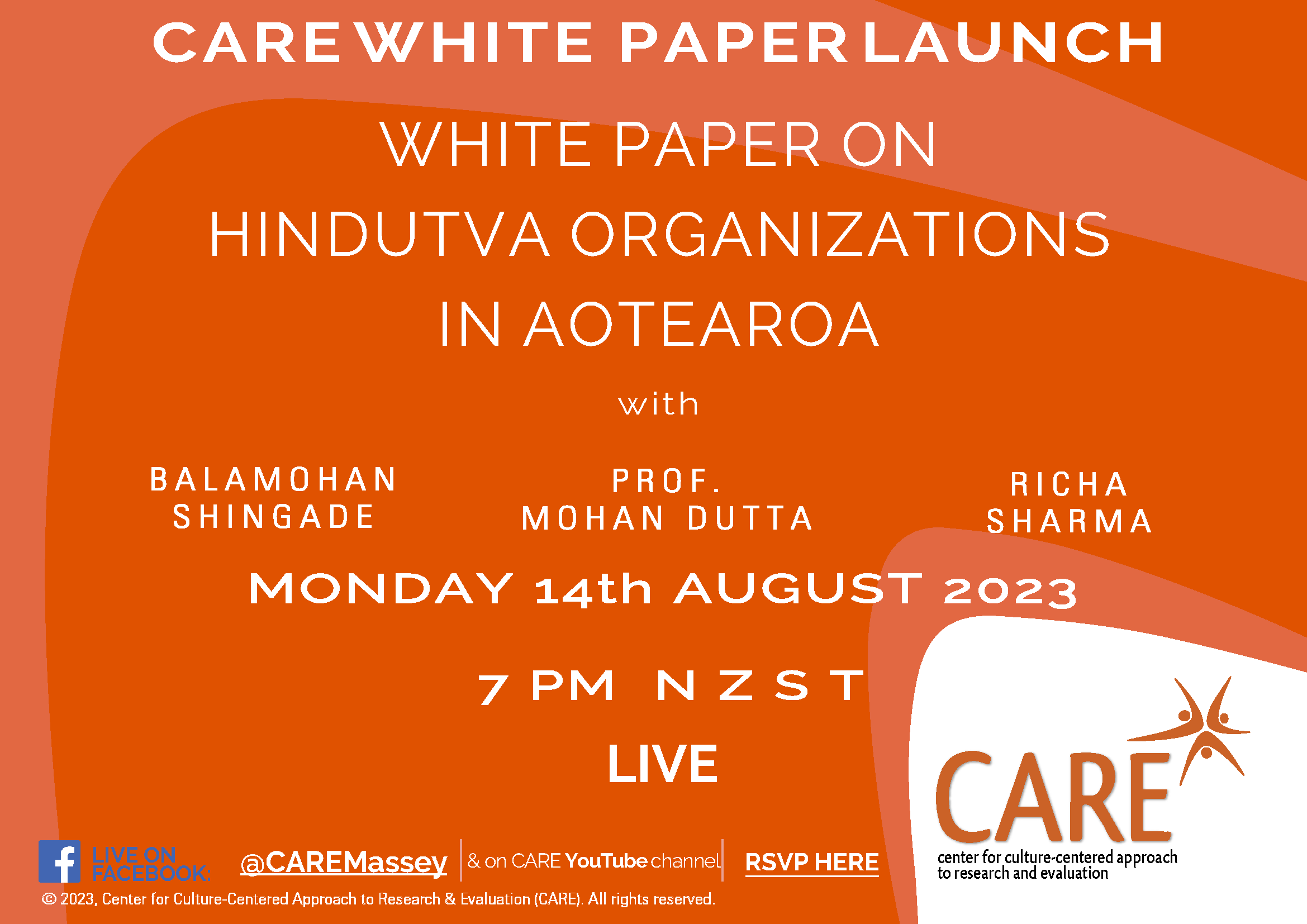Massey University Professor Mohan Dutta joins Emile Donovan to examine the India on RNZ Nights
World’s biggest democracy off to the polls
From Nights, 10:30 pm on 2 May 2024
Massey University Professor Mohan Dutta joins Emile Donovan to examine the India on RNZ Nights
From Nights, 10:30 pm on 2 May 2024
CARE is excited about this upcoming Public Talk, a part of the CARE Visiting Academic Series: The Embodied Meaning Making of Museums – Presented by Professor Greg Dickinson – Professor and Chair Communication Studies, Colorado State University.
Tuesday,23rd April 2024 @ 11am Palmerston North City Library, 2nd Floor- Heritage Space and Livestream on CARE Facebook & CARE YouTube channel.
The presentation explores how contemporary rhetorical scholarship helps us weave together symbolic, material and embodied understandings of museums.
Museums are powerful cultural and communicative institutions. Museums are often and correctly understood as institutions of Western modernity, central to colonialism and imperialism, and are a location of crucial contestations of the relations among past, present, and future. They are also powerfully effective and affective technologies of communication. Understanding how to engage museums as communicative institutions depends on a rich understanding of the modes of museal communication.

In this presentation Prof. Dickinson will trace the communicative and rhetorical modalities of museums. Drawing on my, and my colleagues, research on US American museums—with particular attention to the Buffalo Bill Center of the West—he will focus on the rhetorical nature of collection and display practices within museums. While many within museum studies have explored both collecting and display, rhetoric scholars bring field-specific questions and concerns to these practices, questions and concerns that can enliven us to the political consequentiality of museums. Contemporary rhetorical scholarship helps us weave together symbolic, material, and embodied understandings of museums.
Livestream Links:
Facebook LIVE: https://www.facebook.com/events/1126142745176836
YouTube LIVE:
https://www.youtube.com/watch?v=jG4pwEiJVhA
CARE Facebook Page:
https://www.facebook.com/CAREMassey
CARE YouTube Channel:
https://www.youtube.com/channel/UCF760E7rBst3U5GmJ5FhDDw
CARE Twitter page
https://twitter.com/CAREMasseyNZ
Join us online on Tuesday 09 April 2024, 7pm for CARE’s Special Presentation on Palestine Solidarity and Ramadan with Dr. Fatima Junaid, Tayyaba Khan and Anthony Green.
A conversation around solidarity and the dissonance that Muslims are feeling during Ramadan and may feel at Eid as we keep seeing the Palestinian Genocide.
Supporting each other to keep going with the solidarity efforts and acknowledging that any effort is good as long as we are not silent. Please join us as we ponder on the question of what it means to have Eid in these times.

Livestream Links:
CARE Facebook Page:
https://www.facebook.com/events/957996199291968/
CARE YouTube Channel:
https://www.youtube.com/channel/UCF760E7rBst3U5GmJ5FhDDw
Reading:
Below is a document prepared by Anthony Green for the online talk supported by CARE – Center for Culture-Centered Approach to Research and Evaluation.
A selection of some different perspectives on the uses of language and on ways of seeing – a few examples of texts and sources that may be of interest.
Presenters:
Dr. Fatima Junaid is an experienced consultant and educator working within public and private sector for over a decade. Dr. Junaid has done extensive research with marginalized communities including refugees, women, migrants and fishers’ communities. She focuses on developing mechanisms of support for better wellbeing outcomes. Currently she is a Senior lecturer at Massey University and a member of the several wellbeing (academic and professional) organisations. She also runs a social media support network group for Pakistani women in academia.
Dr Junaid can be reached at f.junaid@massey.ac.nz or
https://www.linkedin.com/in/fatimajunaid1/
Founder and trustee of Khadija Leadership Network, the New Zealand (NZ) Peace Ambassador for the European Muslim League, former Director of Advocacy at the Office of the Health and Disability Commissioner, and a community development practitioner with over 15 years of experience having worked with the migrant and refugee communities in The Occupied Territories of Palestine, Australia, United Kingdom and New Zealand. Tayyaba currently sits on the governance board of Mixit & Belong Aotearoa. She is also a regular panellist on RNZ’s ‘The Panel’, and ‘The AM Show’.
Originally from the UK, he worked as a teacher of English and Literature, first in the UK and then, for eighteen years in Singapore. In the six months’ period after the mosque attacks, and again in the 2020 “anniversary,” he served as spokesperson for the Muslim Association of Canterbury
His writings include books commissioned by Muis (Majlis Ugama Islam Singapura, Singapore’s Islamic Council), dealing with all aspects of the development and work of that body: its history, mosque-building programme, Hajj organisation, and more. His own work includes a history of how people travelled by sea from Southeast Asia to journey to Mecca for the Hajj. His interest is in people’s stories, particularly of those who are “unsung” – what the poet Brian Patten called, “the loose change history spent without caring.”
Image by Palestinian photographer Hosny Salah, currently living in Palestine Gaza Strip
https://pixabay.com/users/hosnysalah-10285169/
CARE Twitter page:
Through her responses to a series of wide-ranging questions, Dr. Samah Jabr, Head of the Mental Health Unit within the Palestinian Ministry of Health, gives essential insights into the ways to understand Palestinian mental health before, during, and after catastrophe and genocide. By invoking the principle of “observing and learning” from Palestinians in Gaza and the West Bank, Dr. Jabr challenges western pathologizing and individualizing around mental health, and offers a community-centered and liberatory alternative framework.
Professor Walid Adel Afifi, Dept of Communication; Associate Dean, Division of Social Science, University of California – Santa Barbara
Associate Professor Guido Veronese, in Clinical and Community Psychology, University of Milan-Bicocca, Italy.
Visiting at Gaza Community Mental Health Program, Gaza where I teach Family Therapy.
Dr. Samah Jabr, consultant Psychiatrist, Head of the Mental Health Unit, MoH
Acknowledgements:
Image by Palestinian photographer Hosny Salah, currently living in Palestine Gaza Strip
Link: https://pixabay.com/users/hosnysalah-10285169/
Music: Native American Drums 2 Hours, Royalty Free Music by Kevin MacLeod
A talk by Prof. Mohan Dutta on Colonial Divide & Rule
In this insightful lecture, Professor Mohan Dutta critically analyzes the colonial divide and rule strategy, examining its historical implementation and its enduring relevance in contemporary contexts. He elucidates how this strategy has been employed to exert control over colonial subjects and draws connections to present-day scenarios. Professor Dutta illustrates the perpetuation of this divide and rule tactic through strategies aimed at fragmenting Maori communities, separating them from ethnic migrant groups. Moreover, he delves into the transformative process of decolonization, emphasizing its role in fostering connection and unity among diverse communities.
White Supremacy, the Intersections of Anti-Māori Hate and Anti-Migrant Racism: The Targeting of Te Tiriti This talk explores the convergence between anti-Māori hate and anti-migrant racism in the context of the attack on Te Tiriti. It notes that the white supremacy that seeks to undermine Te Tiriti is also the ideology that seeks to silence and expel migrants of colour. Based on the analysis, it argues for migrant- Māori solidarity based on Te Tiriti as the foundation for sustaining social cohesion in Aotearoa.
Join us for Professor Cherian George’s Public Talk at the Business Studies (Central) Building, Massey University, BSC B1.08 COMMS Lab. Or join us virtually via the Livestream on our social media platforms.
Facebook Page: https://www.facebook.com/CAREMassey/videos/310113508573077
CARE YouTube Channel: https://www.youtube.com/watch?v=rXwelom8Ac4
The norms and institutions of democracy and human rights are on the back foot around the world. They clearly need to be strengthened. This work has been disrupted and delayed not only by democracy’s opponents but also from within. There are recurring, divisive debates within liberal democracies concerning how much society should tolerate discriminatory speech. This talk searches for guideposts to navigate the contested terrain between free speech and social justice.
Cherian George is a professor of media studies at Hong Kong Baptist University’s School of Communication, and the director of its Centre for Media and Communication Research. His books include Hate Spin: The Manufacture of Religious Offence and its Threat to Democracy (2016); and Red Lines: Political Cartoons and the Struggle against Censorship (2021).
In Dr. Usman Afzali’s talk, “Long-term Effects of Far-Right Terrorism on Muslims in New Zealand,” the enduring consequences of far-right terrorism on the Muslim community in New Zealand are explored. Drawing upon a comprehensive array of scholarly papers and research from the New Zealand Attitudes and Values Study, the presentation investigates the complex dynamics between far-right violence, public attitudes, and the psychological well-being of Muslim minorities. It reveals how far-right terrorism can lead to national distress, affecting community cohesion and overall well-being. Public attitudes toward Muslims in New Zealand, especially following a terrorist attack, are examined, alongside the role of national identity, media influence, and the potential mitigating role of religion. Usman Afzali’s talk offers a comprehensive understanding of the multifaceted impact of far-right terrorism on Muslims in New Zealand, with implications for future research and policy considerations.
Dr. Usman Afzali is the principal investigator of the Muslim Diversity Study, currently working as a postdoctoral research fellow and lecturer at the University of Canterbury in Christchurch, New Zealand. The Muslim Diversity Study examines social attitudes and values of Muslims in New Zealand. Usman’s research interests encompass human flourishing, diversity in religious groups, cognitive psychology (specifically memory suppression), and contemplative neuroscience.
In the Muslim Diversity Study, he leads a team of 24 research assistants and actively collaborates with numerous partners within New Zealand. Additionally, he conducts research in cognitive psychology and neuroscience, and supervises graduate students at various levels (PhD, Masters, and Honours) since 2021. His teaching portfolio includes courses in statistics, research methods, cognitive psychology, and neuroscience.
Website: https://www.usmanafzali.com
Twitter: @UsmanAfzali

Professor Mohan Dutta, Dean’s Chair Professor of Communication and the Director of the Center for Culture-centered Approach to Research and Evaluation (CARE) will deliver the 2023 G. Jack Gravlee endowed lecture in the Department of Communication Studies at Colorado State University on September 19, 2023.
Professor Dutta’s lecture, titled “Decolonization as organizing radical democracies: Centering health, resisting climate colonialism, securing food systems, and resisting hate” will be delivered in conversation with the University’s theme this coming year (2023-2024), Democracy and Civic Engagement.
The lecture will draw upon two decades of ethnographic fieldwork carried out by Mohan Dutta in struggles for Indigenous rights, migrant rights, transgender rights, anti-racism, and working-class politics, exploring the everyday habits of democracy that are sustained through community action.
The talk will outline the key tenets of the culture-centered approach as an organising framework for decolonizing democracies, attending to Indigenous, Black, and various Global South traditions for organising democracies. It will attend to the ways in which white supremacy shapes the infrastructures of settler colonial/postcolonial/neocolonial democracies, with hegemonic notions of democracy scripted into practices of extraction, expulsion, and displacement through the mobilisation of violence.
Professor Dutta will wrap up the talk by offering insights into the organising work of building transformative democracies through the co-creation of community voice infrastructures that work toward achieving the United Nations Sustainable Development Goals, addressing the challenges of climate colonialism, food insecurity, poverty, and digital colonialism.
Professor Mohan Dutta delivers Gravlee Lecture at Colorado State University
CARE White Paper Launch: White Paper On Hindutva Organizations In Aotearoa on Monday, 14th August 2023 with Prof. Mohan Dutta, Balamohan Shingade & Richa Sharma.
Joins us LIVE at 7 pm NZST via Facebook and YouTube to learn more about this important CARE White Paper on the Hindutva.

CAREWhitePaper On Hindutva Organizations In Aotearoa